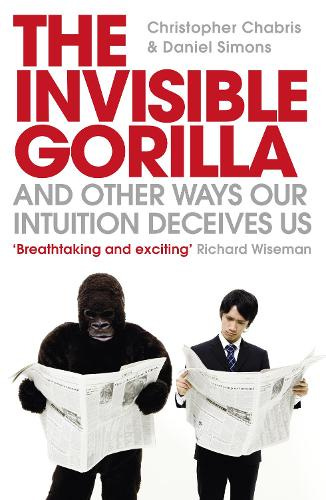I state that I don’t like multi-tasking - I am someone who likes to give my full attention to one thing at a time. Whether that’s writing, cooking, listening to a client or doing Tai Chi – my preference is to be single-focus. Over the course of a day, obviously we have to switch focus regularly. Some activities like brushing teeth or driving can proceed on automatic. Others, such as chopping vegetables, are dangerous if we get distracted.
Some years ago, I was invited to research and prepare a conference presentation on the topic of ‘distraction’. This was for a team involved in microbiology, where any mistake could have life-threatening impacts for patients. There’s a famous experiment, where you have to focus on one aspect of a complex situation. Search for ‘Daniel Simons’ on You Tube (I can’t upload it for copyright reasons).
The insight from this research was that when we’re focusing on one task, we don’t have attention to spare for ‘irrelevant’ information.
Anyway, I was reminded of this when I realised that I was feeling a bit pressured today. My diary was full: moving from a co-coaching call to taking part in my regular yoga group, to a session with a supervisee, to catching up with posts from my peers on the MA course, to finishing re-reading the novel for this evening’s Book Group, then writing this Substack, talking to our daughter, taking part in a Teams call with my MA group, going along to Book Group.

All activities I value and enjoy – but it involves switching hats for each activity, and interacting with different groups of people. Susy the coach, the yoga practitioner, the supervisor, the student, the Book Group member, the blogger. Are all these ‘Susy’s the same person? It feels as if they draw on different aspects of my skills and personality – nothing as simple as left brain/right brain. All, apart from yoga, involve both logic and intuition, analysis and synthesis.
Edward de Bono talked about ‘Six Thinking Hats’ https://www.southampton.ac.uk/~assets/doc/hr/Six thinking hats.pdf
These however, are different steps or stages in decision-making and problem-solving.
Perhaps more relevant is the insight from social psychology: we inhabit different social roles in different situations, each with its own expectations and social norms. https://www.simplypsychology.org/social-roles.html
I’ve certainly been aware that Susy the writer/student of writing operates from a different set of lenses than Susy the psychotherapist/supervisor/coach.
Perhaps the pressure comes from moving from one group of people to another? Again, everyone I’ve spoken to today is someone I respect and value, but I have different roles within each situation. Each grouping has its own purpose and the interpersonal expectations are very different.
For many of us, the COVID lockdowns led to reduced interactions with other people. I know I felt that I’d lost my social skills when we started going out after the lockdowns were lifted. For anyone with social anxiety, the impact is still being felt. Interacting with other people involves understanding and assessing a lot of mental and emotional information. Decoding the content of what is being said, interpreting body language, choosing an appropriate response.

I’m an extravert, so I find contact with others stimulating, and my varied activities today feed different needs: to nourish my spiritual self, stretch my body, be useful, share information, have fun and be social – and, in this blog, to work out how I experience these separate elements, and what I can learn from reflecting on the experience.
Moving from one activity straight to another doesn’t leave time for reflection – in modern jargon ‘processing’.
So it’s not the number of activities, or the different parts of self involved, that creates the feeling of pressure – it’s reflection time: having space to remember each, think it over, enjoy the memory, before slotting it into the appropriate place in the mental filing cabinet.



